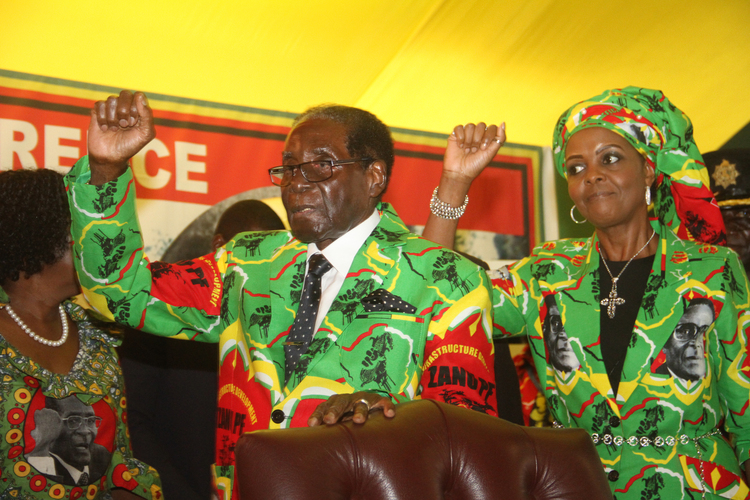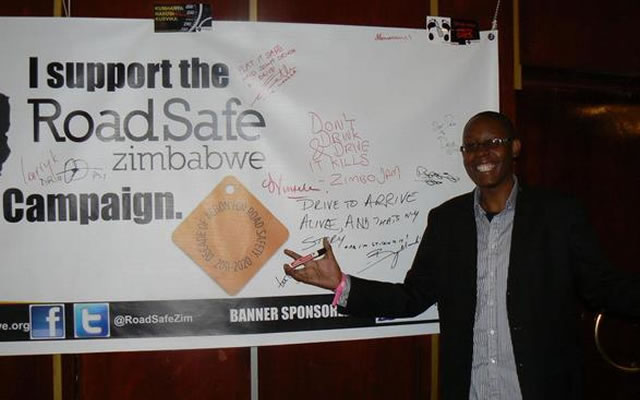Cherry-picking to get a Mugabe story


zanu-pf President and First Secretary Cde R. G Mugabe and First Lady Amai Grace Mugabe, who is also the revolutionary party’s Secretary for Women’s Affairs, greet delegates on arrival for the 16th Annual National People’s Conference in Masvingo last week
The Arena Hildegarde
The Oxford English dictionary defines foreword as “a short introduction to a book, typically by a person other than the author”, while the Writers and Editors website says “a foreword deals with the genesis, purpose, limitations, and scope of the book … The foreword, says the Chicago Manual of Style, is usually written by someone eminent (to lend credibility to the book).”
This instalment is not about writing skills. Rather, it is a response to the lead story in the Daily News of December 20, titled: “Mugabe fuels Zanu-PF wars … as party’s resolutions take centre stage”.
What is striking about the article’s contents is that the ruling party’s President and First Secretary, who is alleged to be fueling the factional fights in his own party, also made “innocuous comments” in the foreword to the 2016 “Zanu-PF Central Committee Report to the 16th Annual National People’s Conference”.
The writer, Fungi Kwaramba, says in part: “In ordinarily innocuous comments that were contained in his foreword… Mugabe expressed general concern about the slow pace of implementation of the party resolutions – which, as would be expected, has fed oxygen to the ruling party’s lively conspiracy mill.”
Innocuous sounds like a dirty word, but it means harmless. The irony is therefore that harmless remarks give succor to “the ruling party’s lively conspiracy mill!”
It is a fact that in his foreword to the report, President Mugabe, among other issues, wrote in the second-last paragraph that, “the party should ensure that its policies and resolutions are being implemented. Unfortunately, I have noted some yesteryear resolutions that continue to come back every year. May the responsible departments attend to this because procrastination and lack of action should not be tolerated in the party.”
Prior to that, President Mugabe also raised issues about economic recovery and stabilisation through the Zimbabwe Agenda for Sustainable Socio-Economic Transformation (Zim-Asset).
He also spoke about the state of the party, pointing out that Zanu-PF’s performance “across all the major areas has been largely laudable save for the following that need urgent redress: factionalism, corruption, lack of production and party finances”.
Other issues raised in the two-and-half page foreword are party structures, Zanu-PF’s performance in by-elections and the reinstituted Herbert Chitepo Ideological School.
Why then should a normal but important observation on lack of follow-ups and/or implementation of resolutions and policies passed at the party’s national conferences and/or congresses be pigeon-holed to make it look like the President was only referring to the resolution made by the Women’s League regarding the women’s quota, during the 2015 Victoria Falls conference?
Why also limit the President Mugabe’s remark to women’s calls for representation in the Presidium, when the goal for the 50-50 representation in key policy decision-making areas is not just for Zanu-PF, but encompasses every facet of life?
Gender mainstreaming is a global policy, and not a preserve of one nation.
There is, however, more to the story since the just-ended Annual National People’s Conference left the revolutionary party’s detractors clutching at straws.
Through this nitpicking, you sense a certain level of disappointment, as the private media was hoping against hope that there would be dissonance at the conference, with the bloodbath they had predicted coming to pass.
But, the much anticipated drama did not materialise. Before President Mugabe delivered his opening remarks in Masvingo, Vice President Phelekezela Mphoko put paid to the claims and counter-claims that the indaba would be turned into an extraordinary elective conference, notwithstanding that the Zanu-PF constitution does not have such a provision.
VP Mphoko was unequivocal when he told delegates: “I would like to emphasise to you that this is an ordinary Zanu-PF National People’s Conference in accordance with our party constitution. It is not an elective conference or congress. We are gathered here to review the party and Government performances during 2016.
“We are not gathered here to talk about positions or to elect new people to key party positions. That is the work of the congress. We should aim for the best results and outcomes of this conference in preparation for the 2018 general elections.”
The Daily News story goes on to say that President Mugabe’s concern was short on specifics as they claim that he “did not mention any of the outstanding resolutions that he may have in mind, with the party’s legal department saying in its defence in the same report that it was financially constrained …”
How they singled out the legal department is a matter of interest, since the President said: “May the responsible departments (not just legal) attend to this.”
This particular bit made the writer ask whether we speak from the same page when we talk about forewords to books. Should a foreword contain everything when the person who writes it is not the author of the book?
If that is the case, then it ceases to be a foreword, but another book, that would also require its own foreword.
Zanu-PF has been holding conferences and congresses for a very long time. Just like any other organisation, both local and international, resolutions and policy decisions – some of them very important – might not be followed upon and implemented.
This is why President Mugabe was reminding his comrades-in-arms that talk is cheap, unless it is followed by results-based action.
Taking the President to task for not outlining the resolutions that have not been acted upon over the years is strange. If they know them, why not just present the list for purposes of informing and educating readers?
Ascribing a desired resolution – a woman in the Presidium – is a desperate attempt by the Daily News to take what they thought would be an agenda item through the back door.
Finally, in that foreword, it was not just the unimplemented resolutions the President was not happy about. He also wrote, “Data on the distribution of membership data forms is disappointing for all provinces and districts except Matabeleland South . . .”
This writer thinks that cherry-picking issues in order to make a relevant Mugabe story for the publication is daylight “robbery” for readers who need to know and understand how Zimbabwe’s political systems function.






Comments